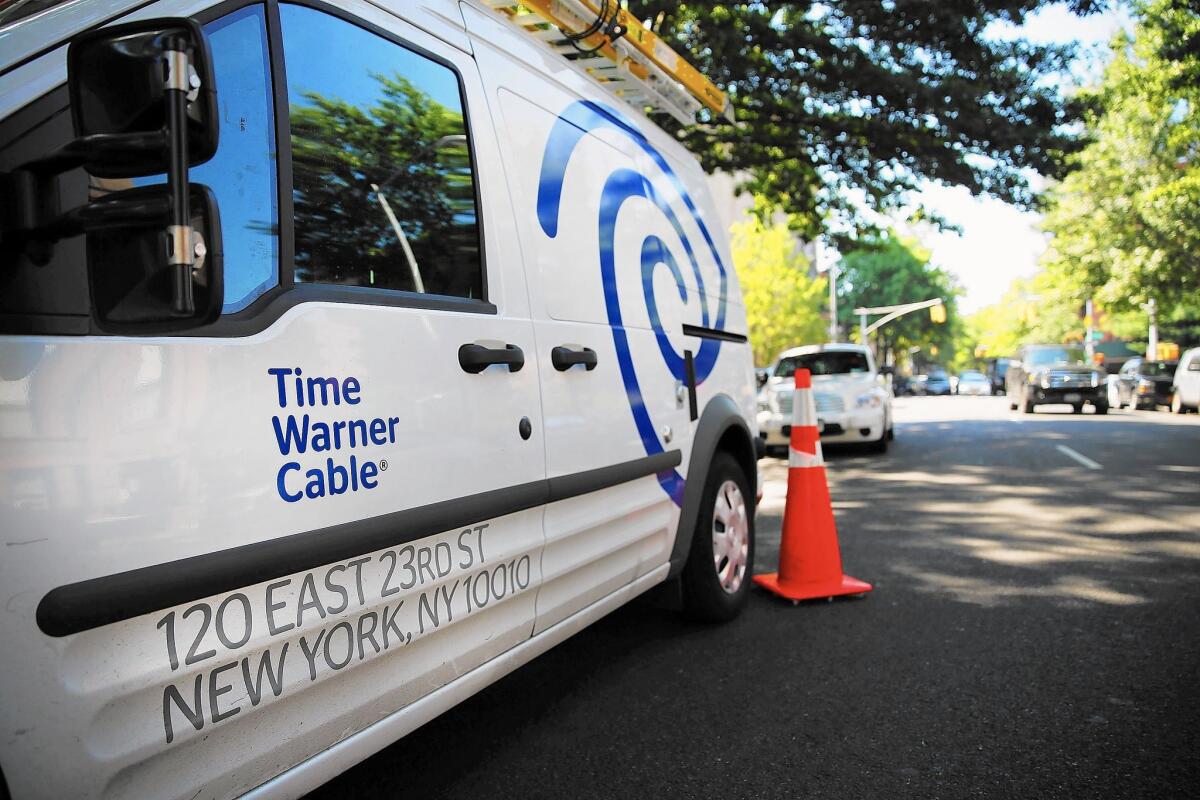Time Warner Cable sneaks in higher fees to customers

- Share via
Time Warner Cable customers may have been wondering whether there was a hidden catch when the company recently upgraded people’s Internet modems for free. Time Warner said there was nothing sneaky going on.
There was.
Over the holidays, the cable giant, now in the process of merging with its even larger rival Comcast, quietly jacked up its monthly modem-lease fee to $8 from $5.99. That’s an increase of nearly 34%.
And as if that wasn’t a big-enough kick in the pants for customers, Time Warner also has added a $2.75 monthly charge for sports channels — regardless of whether you watch them — and boosted its monthly charge for local channels to $2.75 from $2.25.
It’s the old saw about robbing banks because that’s where the money is. In the third quarter of last year, Time Warner lost 184,000 pay-TV subscribers, but it gained 92,000 residential Internet customers.
The writing’s on the wall: People are increasingly cutting the cable cord and turning instead to online services such as Netflix and Hulu, which still require broadband Internet access.
Time Warner’s answer is to raise fees for Internet users, since that’s where the growth is, while at the same time slap around remaining pay-TV subscribers because, well, why not? They should be used to it by now.
The company defends the increases by saying that its offerings are getting better in all sorts of ways. For example, it says Internet speeds are faster, more on-demand programming is available, there are more Wi-Fi hot spots, and it even has a slick new mobile app.
Glendale resident Glen Redman, for one, isn’t impressed.
“I haven’t seen my Internet go any faster,” he told me. “I don’t use on-demand. I don’t use a mobile device.” As for that new app, “I don’t use that, either.”
Redman said the higher prices seem to be part of a broader strategy to keep money pouring in despite Time Warner’s changing fortunes. As of Sept. 30, the company had 10.8 million residential pay-TV subscribers, down from 11.4 million a year earlier.
“It’s all nickel-and-dime stuff, but it adds up,” Redman, 69, said of his rising cable bill.
The heftier charge to use a Time Warner modem is an especially blatant cash grab. In October, the company notified Internet customers that because it was adding more zip to its Los Angeles broadband network, it would provide customers with faster modems.
The company said new average speeds, depending on your service level, would be three to six times faster — at no added cost.
That was then. Those faster modems are now a third more expensive.
“Thirty percent!” Redman said. “Nothing has gone up 30% in the last year.”
Emily Rusch, executive director of the California Public Interest Research Group, said Time Warner customers should take a look at buying their own modems, rather than leasing them from the company.
“It might not make sense for many people to pay such a high monthly charge,” she said.
Time Warner’s new modem fee will run you almost $100 a year. High-speed modems compatible with the company’s network sell for about $130, though slightly slower gear can be found for about $90.
Dennis Johnson, a Time Warner Cable spokesman, defended the higher modem-rental cost by pointing out that the fee for Internet access hasn’t gone up — yet. The company’s last increases for various Internet service levels was in March.
“There is no change in the price of Time Warner Cable Internet plans, although speeds have increased,” Johnson said.
He said the fatter modem fee “reflects our investment in new modems that support these faster speeds and better Internet experience,” which basically means that even though the company didn’t charge people for the upgrade at the time, it’s charging them now.
Johnson said Time Warner has invested “more than $427 million in network improvements and reliability.” He also said the $2.75 monthly fees for sports and local channels reflect higher programming costs.
“Our fees paid to local broadcast channels have soared 60% the past two years alone, and the cost of cable sports networks has increased 91% since 2008,” Johnson said.
“We think it’s important to show customers the impact of these rising costs through a specific item on their bill,” he said of the charge for sports channels.
That, of course, is hooey. It assumes that Time Warner’s roughly 2 million L.A. subscribers are sports fans and want these channels.
I’m not and I don’t, and I know that I speak for many other local subscribers when I say that I shouldn’t have to pay for channels I never watch. If Time Warner wants to pass along its sports-programming costs, it should do so only to those who want these channels.
It’s hard not to think that the company is trying to stick all its subscribers with covering the ridiculous $8.4 billion it paid to distribute Dodgers games — a cost so high that no other major pay-TV companies have agreed to play ball by charging their own customers an estimated $5 a month for the channel.
Rusch said it’s time for Time Warner and other pay-TV providers to allow customers to opt out of sports channels. This would be a logical first step toward complete a la carte programming, or paying only for the channels you desire, she said.
But that probably won’t happen without legislative or regulatory intervention. The pay-TV industry seems determined to stick to its antiquated ways for as long as it can, even if that means burdening customers with increasingly unreasonable and unfair bills.
The industry knows that more and more people will drop their cable or satellite plans and move online. Its new motto seems to be “If you can’t beat ‘em, soak ‘em.”
A footnote: Time Warner Cable recently was named the least-liked company in America, according to a survey by the University of Michigan.
And this was before the latest price hikes.
David Lazarus’ column runs Tuesdays and Fridays. He also can be seen daily on KTLA-TV Channel 5 and followed on Twitter @Davidlaz. Send your tips or feedback to [email protected].
More to Read
Inside the business of entertainment
The Wide Shot brings you news, analysis and insights on everything from streaming wars to production — and what it all means for the future.
You may occasionally receive promotional content from the Los Angeles Times.











